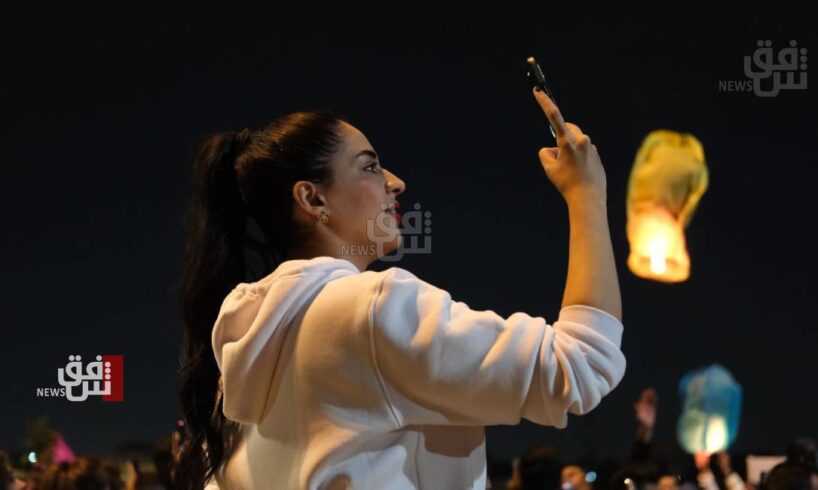
Shafaq News
Love is crossing new borders in Iraq. Once guided by tribal,
sectarian, or local traditions, marriage is now reflecting the country’s
growing connection to the wider world. In recent years, unions between Iraqis
and foreigners—whether formed at home or abroad—have become increasingly
common, quietly reshaping ideas of family, identity, and belonging.
Global Unions Surge
According to the Iraqi Ministry of Justice, cross-cultural
marriages accounted for about 7% of registered unions in 2024, a share that
rises significantly among Iraqis living overseas. Most of these unions link
Iraqis with partners from Iran, Turkiye, and Russia, while smaller yet growing
numbers involve spouses from Latin America and East Asia.
Migration, education, work opportunities, and online
connections remain the main forces behind this rise. Many couples first meet
through social media or dating platforms—about 65% of Iraqi-foreign marriages
begin online, helped by instant translation tools that bridge language gaps and
make communication effortless.
With internet penetration now exceeding 78% of the
population and nearly 83% of young Iraqis active on social media, based on
official data, this digital landscape—unthinkable two decades ago—has opened
new paths for relationships while accelerating the wider social transformations
that have shaped Iraq since 2003.
When Love Melts In A Foreign Winter
Love across cultures requires more than affection.
Compatibility, communication, and the willingness to adapt to each other’s
values and lifestyles often determine whether such marriages thrive or falter.
Fatima Hussein, 30, knows how vast those differences can be.
She married a Russian man she met while studying in Moscow.
“I wanted to open myself to other cultures and embrace them
while bridging the wide gap between Iraqi and Russian traditions,” she shared
with Shafaq News. But the experience, she admitted, “was a failure.”
A 2024 article from the Journal of Marriage and Family
indicates that intercultural couples face a 20–25% higher divorce risk in their
early years. Still, those who develop empathy and flexibility often find deeper
satisfaction as their relationships mature.
“I encountered situations I never expected, due to the vast
differences in behaviors, emotions, and warmth I was used to in Iraq.” Her
husband, she explained, was kind but emotionally distant. “His feelings were as
cold as Moscow’s weather, and he could not change his strict, decisive nature
in disagreements. An Iraqi woman cannot endure such emotional dryness.”
After completing her studies, Fatima returned home. The
experience, though difficult, left her with a deeper understanding of another
culture. She learned Russian, adapted to customs such as removing shoes before
entering a home, and grew used to the idea that smiling at strangers can be
seen as naïve. She even came to enjoy celebrating the New Year three times.
To this day, she still prepares compote, the traditional
Russian juice made from berries, apples, and sugar.
New Kitchen Rules
For some Iraqis, the rewards of cultural exchange outweigh
the challenges.
Saeed Al-Jizani, who married a Venezuelan woman, views his
relationship as an education in itself. “One advantage of marrying a foreigner
is learning about their culture. Global cultures are closer today thanks to
technology,” he reflected.
Language, he noted, often becomes the first bridge. A 2024
study from the Civil Society Knowledge Centre shows that over 70% of
Iraqi-foreign couples communicate initially in English before learning each
other’s native languages. Yet distance from home can place pressure on these
relationships, as foreign partners may find it easier to leave if their ties to
Iraq are weak.
Even daily life can reveal cultural contrasts. “Some Iraqis
insist on traditional dishes like Tashreeb [meat cooked in a stew with
vegetables] and Dolma [stuffed vegetables with rice and meat], while foreign
wives may prefer pizza or fajitas,” he explained. Respecting each other’s
culinary traditions, he added, is key to balance and understanding.
A Bridge Built On Patience
For others, exposure to different cultures and religions is
part of the appeal. Omar Al-Samarrai, married to an American woman, describes
his marriage as a “journey into diversity.” It gave him insight into another
world’s customs, cuisines, and moral values. But it also came with challenges.
His wife, he noted, was deeply rooted in her culture and
sometimes resisted Iraqi traditions or religion. Finding common ground, he
added, requires patience—especially when raising children.
A 2023 UNICEF regional survey found that around 42% of
children from intercultural marriages grow up bilingual, navigating both
parents’ values and religious expectations. They often display strong social
adaptability but may face identity confusion during adolescence.
For Dima Khalid, married to a Greek man, learning and
dialogue became the foundation of her relationship. “Not all customs from home
are correct, and not all foreign habits are beneficial. Social practices are
shaped by circumstances and accumulated culture,” she reflected.
She treasures Iraqi hospitality but also appreciates the
freshness her marriage introduced into her daily life. “Marrying a foreigner
brings renewal—breaking monotony in conversation, leisure, and food,” she said.
“But one must start anew with their partner, leaving behind old habits for the
relationship to thrive.”
Read more: Love under strain: Iraq’s young struggle to tie the knot
Romance Meets Regulation
Beyond emotional and cultural challenges, these marriages
often bring legal and bureaucratic hurdles. Securing residency, citizenship,
and proper documentation can be demanding, particularly when children are
involved.
Data from Iraq’s Civil Status Directorate reveals that
between 2020 and 2023, more than 2,700 applications were filed for citizenship
or legal recognition of foreign spouses and children born abroad. With each
country following its own legal framework, couples must navigate not only love
but also paperwork that can define their family’s future.
Empathy is Key
Whether they end in harmony or heartbreak, these marriages
reflect Iraq’s changing social fabric. They reveal a society no longer confined
by old boundaries—one whose sons and daughters are meeting the world, and
sometimes, marrying it.
Many describe their unions as enriching and transformative;
others find them emotionally demanding. Yet one truth runs through all their
stories: the success of any marriage rests on compatibility, understanding, and
emotional connection.
Love may begin across borders, but it lasts only when two
hearts learn to speak the same language—whether in Arabic, Russian, Greek, or
something far deeper.
Read more: When marriage in Iraq turns into mirage: suitors explore their chances abroad
Written and edited by Shafaq News staff.





